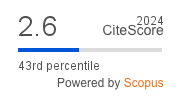The Superiority of Fine-tuning over Full-training for the Efficient Diagnosis of COPD from CXR Images
DOI:
https://doi.org/10.4114/intartif.vol27iss74pp62-79Keywords:
Chest X-ray(CXR), COPD, Fine-tuning,, Pre-trained Models, ResNet50, VGG19Abstract
This research investigates the use of deep learning for diagnosing lung diseases like Chronic Obstructive Pulmonary Disease (COPD) using Chest X-rays (CXR). The study compares the impact of deep learning on improving these diagnoses by comparing the performance of models trained from the scratch with those enhanced through fine-tuning established architectures like InceptionV3, ResNet50, and VGG-19. The study revealed that fine-tuning pre-trained models offers significant benefits: faster convergence, improved stability, and increased accuracy. Data augmentation techniques were found to be particularly useful when dealing with limited or unbalanced datasets. A custom CNN model, Iyke-Net, showed promising results when fine-tuned. Interestingly, it was observed that models using grayscale images outperformed those using colour images in disease classification, suggesting that colour information might be less critical than previously thought for certain diagnostic procedures. The study emphasizes the importance of balancing model complexity with computational efficiency and diagnostic accuracy. It advocates for refining existing deep learning models for COPD diagnosis from CXR images, paving the way for further innovations in AI-enhanced medical diagnostics.
Downloads
Metrics
Downloads
Published
How to Cite
Issue
Section
License
Copyright (c) 2024 Iberamia & The Authors

This work is licensed under a Creative Commons Attribution-NonCommercial 4.0 International License.
Open Access publishing.
Lic. under Creative Commons CC-BY-NC
Inteligencia Artificial (Ed. IBERAMIA)
ISSN: 1988-3064 (on line).
(C) IBERAMIA & The Authors










